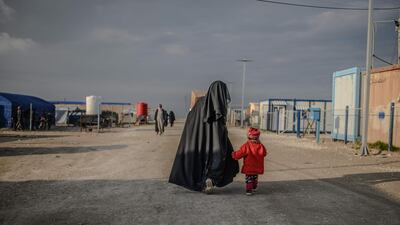As many as 20,000 Iraqi nationals who have been detained or held in camps in Syria after fleeing ISIS’s last pocket of fighters, could be sent home in a matter of weeks after a deal agreed with Baghdad.
The Red Cross said on Monday that the Iraqi government has expressed a willingness to bring those nationals back to the country to be screened and face justice if they are considered to be a security threat or if there is evidence that they have already committed crimes under the ISIS umbrella.
Thousands of people – many of them the wives of ISIS fighters and their children – have streamed out of the besieged enclave at Baghouz over the past weeks, forcing the US-backed Syrian Democratic Forces (SDF) to delay an assault to wipe out the last vestige of the militants’ territorial rule.
Most have gone to Al Hol in northeast Syria where some 65,000 people now live in an overflowing camp. Many are Iraqis who had fled after ISIS lost territory in the neighbouring country, fearing retribution from Shiite militias.
"Among the people who reached Al Hol camp you have a significant number of people who are of Iraqi origin. Figures are not official but probably we are talking about 20,000 people, including women and children," Fabrizio Carboni, ICRC regional director for the Middle East, told Reuters in Geneva.
"The Iraqi government has expressed its will to bring those people back, but it's obviously a challenging situation. Those people are considered as a security threat, so it means that they will have to go through a screening process."
There was "no official date" to his knowledge for the huge transfer, Mr Carboni said. "But according to our understanding, it's a matter of weeks or months," he said.
Most are believed to be civilians, but they could include fighters, the ICRC said.

